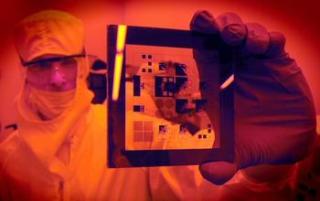Sep 22 2015
To advance research in nanoscale science, engineering and technology, the National Science Foundation (NSF) will provide a total of $81 million over five years to support 16 sites and a coordinating office as part of a new National Nanotechnology Coordinated Infrastructure (NNCI).
 The North Carolina Research Triangle Nanotechnology Network, made up of North Carolina State University, Duke University, and University of North Carolina at Chapel Hill, will enable innovation and commercialization of new promising nanotechnologies. Shown here is a researcher examining a photomask for a patterning sample at the Chapel Hill Analytical and Nanofabrication Laboratory at UNC-Chapel Hill. Credit: Dan Sears, the University of North Carolina at Chapel Hill
The North Carolina Research Triangle Nanotechnology Network, made up of North Carolina State University, Duke University, and University of North Carolina at Chapel Hill, will enable innovation and commercialization of new promising nanotechnologies. Shown here is a researcher examining a photomask for a patterning sample at the Chapel Hill Analytical and Nanofabrication Laboratory at UNC-Chapel Hill. Credit: Dan Sears, the University of North Carolina at Chapel Hill
The NNCI sites will provide researchers from academia, government, and companies large and small with access to university user facilities with leading-edge fabrication and characterization tools, instrumentation, and expertise within all disciplines of nanoscale science, engineering and technology.
The NNCI framework builds on the National Nanotechnology Infrastructure Network (NNIN), which enabled major discoveries, innovations, and contributions to education and commerce for more than 10 years.
"NSF's long-standing investments in nanotechnology infrastructure have helped the research community to make great progress by making research facilities available," said Pramod Khargonekar, assistant director for engineering. "NNCI will serve as a nationwide backbone for nanoscale research, which will lead to continuing innovations and economic and societal benefits."
The awards are up to five years and range from $500,000 to $1.6 million each per year. Nine of the sites have at least one regional partner institution. These 16 sites are located in 15 states and involve 27 universities across the nation.
Through a fiscal year 2016 competition, one of the newly awarded sites will be chosen to coordinate the facilities. This coordinating office will enhance the sites' impact as a national nanotechnology infrastructure and establish a web portal to link the individual facilities' websites to provide a unified entry point to the user community of overall capabilities, tools and instrumentation. The office will also help to coordinate and disseminate best practices for national-level education and outreach programs across sites.
Funding for the NNCI program is provided by all NSF directorates and the Office of International Science and Engineering.
New NNCI awards:
- Mid-Atlantic Nanotechnology Hub for Research, Education and Innovation, University of Pennsylvania with partner Community College of Philadelphia, principal investigator (PI): Mark Allen
- Texas Nanofabrication Facility, University of Texas at Austin, PI: Sanjay Banerjee
- Northwest Nanotechnology Infrastructure, University of Washington with partner Oregon State University, PI: Karl Bohringer
- Southeastern Nanotechnology Infrastructure Corridor, Georgia Institute of Technology with partners North Carolina A&T State University and University of North Carolina-Greensboro, PI: Oliver Brand
- Midwest Nano Infrastructure Corridor, University of Minnesota Twin Cities with partner North Dakota State University, PI: Stephen Campbell
- Montana Nanotechnology Facility, Montana State University with partner Carlton College, PI: David Dickensheets
- Soft and Hybrid Nanotechnology Experimental Resource, Northwestern University with partner University of Chicago, PI: Vinayak Dravid
- The Virginia Tech National Center for Earth and Environmental Nanotechnology Infrastructure, Virginia Polytechnic Institute and State University, PI: Michael Hochella
- North Carolina Research Triangle Nanotechnology Network, North Carolina State University with partners Duke University and University of North Carolina-Chapel Hill, PI: Jacob Jones
- San Diego Nanotechnology Infrastructure, University of California, San Diego, PI: Yu-Hwa Lo
- Stanford Site, Stanford University, PI: Kathryn Moler
- Cornell Nanoscale Science and Technology Facility, Cornell University, PI: Daniel Ralph
- Nebraska Nanoscale Facility, University of Nebraska-Lincoln, PI: David Sellmyer
- Nanotechnology Collaborative Infrastructure Southwest, Arizona State University with partners Maricopa County Community College District and Science Foundation Arizona, PI: Trevor Thornton
- The Kentucky Multi-scale Manufacturing and Nano Integration Node, University of Louisville with partner University of Kentucky, PI: Kevin Walsh
- The Center for Nanoscale Systems at Harvard University, Harvard University, PI: Robert Westervelt